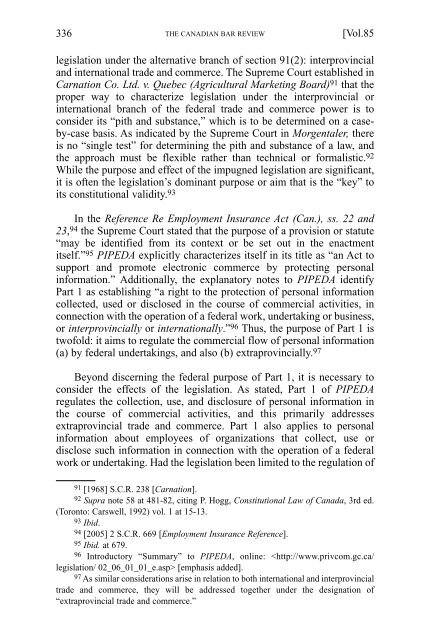PIPEDA: A CONSTITUTIONAL ANALYSIS - Goodmans
PIPEDA: A CONSTITUTIONAL ANALYSIS - Goodmans
PIPEDA: A CONSTITUTIONAL ANALYSIS - Goodmans
You also want an ePaper? Increase the reach of your titles
YUMPU automatically turns print PDFs into web optimized ePapers that Google loves.
336 THE CANADIAN BAR REVIEW<br />
[Vol.85<br />
legislation under the alternative branch of section 91(2): interprovincial<br />
and international trade and commerce. The Supreme Court established in<br />
Carnation Co. Ltd. v. Quebec (Agricultural Marketing Board) 91 that the<br />
proper way to characterize legislation under the interprovincial or<br />
international branch of the federal trade and commerce power is to<br />
consider its “pith and substance,” which is to be determined on a caseby-case<br />
basis. As indicated by the Supreme Court in Morgentaler, there<br />
is no “single test” for determining the pith and substance of a law, and<br />
the approach must be flexible rather than technical or formalistic. 92<br />
While the purpose and effect of the impugned legislation are significant,<br />
it is often the legislation’s dominant purpose or aim that is the “key” to<br />
its constitutional validity. 93<br />
In the Reference Re Employment Insurance Act (Can.), ss. 22 and<br />
23, 94 the Supreme Court stated that the purpose of a provision or statute<br />
“may be identified from its context or be set out in the enactment<br />
itself.” 95 <strong>PIPEDA</strong> explicitly characterizes itself in its title as “an Act to<br />
support and promote electronic commerce by protecting personal<br />
information.” Additionally, the explanatory notes to <strong>PIPEDA</strong> identify<br />
Part 1 as establishing “a right to the protection of personal information<br />
collected, used or disclosed in the course of commercial activities, in<br />
connection with the operation of a federal work, undertaking or business,<br />
or interprovincially or internationally.” 96 Thus, the purpose of Part 1 is<br />
twofold: it aims to regulate the commercial flow of personal information<br />
(a) by federal undertakings, and also (b) extraprovincially. 97<br />
Beyond discerning the federal purpose of Part 1, it is necessary to<br />
consider the effects of the legislation. As stated, Part 1 of <strong>PIPEDA</strong><br />
regulates the collection, use, and disclosure of personal information in<br />
the course of commercial activities, and this primarily addresses<br />
extraprovincial trade and commerce. Part 1 also applies to personal<br />
information about employees of organizations that collect, use or<br />
disclose such information in connection with the operation of a federal<br />
work or undertaking. Had the legislation been limited to the regulation of<br />
91 [1968] S.C.R. 238 [Carnation].<br />
92 Supra note 58 at 481-82, citing P. Hogg, Constitutional Law of Canada, 3rd ed.<br />
(Toronto: Carswell, 1992) vol. 1 at 15-13.<br />
93 Ibid.<br />
94 [2005] 2 S.C.R. 669 [Employment Insurance Reference].<br />
95 Ibid. at 679.<br />
96 Introductory “Summary” to <strong>PIPEDA</strong>, online: [emphasis added].<br />
97 As similar considerations arise in relation to both international and interprovincial<br />
trade and commerce, they will be addressed together under the designation of<br />
“extraprovincial trade and commerce.”
















